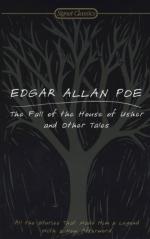|
This section contains 7,203 words (approx. 25 pages at 300 words per page) |

|
SOURCE: “‘Reading Encrypted but Persistent': The Gothic of Reading and Poe's ‘The Fall of the House of Usher,’” in Studies in American Fiction, Vol. 27, No. 1, Spring, 1999, pp. 3-20.
In the following essay, Hustis provides a brief history of Poe's reception as a writer within American critical circles, noting that the ambiguity of Poe's texts, among them “The Fall of the House of Usher,” has led to debate on whether his writings belong within the American literary canon.
Trickery, hoaxes, hieroglyphs, and ciphers: few writers have foregrounded such mechanisms of duplicity in their fiction as did Edgar Allan Poe. This is perhaps why the status of Poe's texts within the American literary canon has been so fiercely contested and debated. As many critics have noted, it is precisely the prevalence of such motifs of ambiguity and linguistic, hermeneutic, and ontological uncertainty that have led to the resurrection and revaluation...
|
This section contains 7,203 words (approx. 25 pages at 300 words per page) |

|


